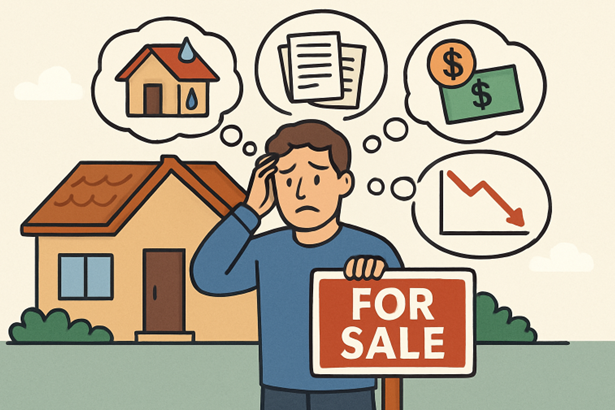Selling your home can be a complex and sometimes overwhelming process, filled with both anticipation and uncertainty. From the first thought of putting your house on the market through to signing the closing documents, homeowners often encounter a range of emotional, practical, and financial challenges that can derail even the best-laid plans. The ever-changing landscape of the real estate market adds extra layers of complexity to the process, making it important to approach selling your property with a solid strategy in place. Suppose you’re looking for a reliable guide who understands these challenges and can help you avoid unnecessary stress. In that case, NC Property Buyers can provide valuable insight, resources, and support throughout your home-selling journey.
Preparation, strategy, and objectivity help smooth the process and anticipate issues. Challenges may seem daunting, especially for first-time sellers, but understanding what to expect and how to handle obstacles increases success chances. Connecting with experienced services like NC Property Buyers can help avoid pitfalls, make informed decisions, and guide each step. Challenges start before the “For Sale” sign goes up, with emotions, market realities, and unforeseen hurdles affecting timelines and prices. Unresolved legal issues, emotional attachments, incorrect pricing, overlooked repairs, and poor marketing can delay or reduce offers. Staying aware of legal issues and market trends ensures your property remains competitive. Equipping yourself with current info, a proactive plan, and local experts simplifies navigation and leads to faster, more profitable sales.
If you need to move fast or are considering a non-traditional route—perhaps to avoid repairs, agent commissions, or drawn-out negotiations—learning about the process to sell a house for cash in NC can offer a convenient, stress-free alternative to the traditional listing approach. Cash buyers often provide quicker closings and fewer contingencies, which may be ideal if you’re on a timeline or facing financial challenges.

Key Takeaways
- Emotional attachment can hinder objective decision-making.
- Setting an unrealistic price may deter potential buyers.
- Neglecting necessary repairs can lead to reduced offers.
- Poor marketing strategies can limit buyer interest.
- Legal and financial issues can delay or derail the sale.
Emotional Attachment
It’s completely natural to feel emotionally connected to your home, especially if you’ve spent years making memories there—hosting family gatherings, raising children, or celebrating personal milestones. However, this emotional attachment can become one of the most significant barriers to a smooth and efficient sale. Many homeowners struggle to accept constructive feedback during showings or appraisals, resulting in resistance to making changes that could make the property more attractive to buyers. Sellers may also overvalue their home because of their personal memories, rather than objective market conditions or buyer perceptions.
To overcome this, it’s essential to try to detach emotionally from the transaction and approach the sale from a business perspective. Remind yourself that selling your home is an important step toward your own next chapter, whether that involves relocating for a new job, downsizing, or moving closer to loved ones. Setting clear future goals—like finding your next dream property or freeing up cash for other opportunities—can help replace sentimentality with optimism about what comes next.
Setting an Unrealistic Price
Pricing your home correctly is absolutely critical to attracting qualified buyers and ensuring a timely sale. Overpricing is a common mistake, particularly for owners who are emotionally invested in their property or who want to recover every dollar spent on upgrades. An asking price that’s well above market value can deter potential buyers from even scheduling a viewing, causing the home to sit on the MLS for months and ultimately becoming “stale” in the eyes of agents and buyers alike.
According to a 2025 report from Kiplinger, the median sales price was $403,700, revealing just how much market conditions can change in a short period of time. To set a realistic price point, work with an agent to conduct a comparative market analysis (CMA), review recent sales in your neighborhood, and consider current trends in both inventory and buyer demand. Competitive pricing attracts more offers, creates momentum, and often leads to a better overall outcome for the seller.
Neglecting Necessary Repairs
Unaddressed repairs and maintenance issues are a major red flag for buyers, often surfacing during home inspections and becoming deal-breakers. Buyers are typically wary of homes that require significant repairs, fearing hidden problems or unexpected costs down the line. Common concerns include leaky pipes, outdated electrical wiring, damaged roofs, mold, pest infestations, or even seemingly minor cosmetic issues such as flooring or peeling paint. Addressing necessary repairs before you list your property helps portray your home as “move-in ready,” which is highly desirable in today’s fast-paced market. Pre-listing inspections can identify any major problems early, allowing you to fix them on your own terms instead of negotiating costly concessions later. According to the National Association of Home Builders, homes that are in top condition typically sell faster and for higher prices, giving sellers a significant advantage.
Poor Marketing Strategies
Even the best home can go unnoticed if it isn’t marketed effectively to potential buyers. In today’s competitive real estate environment, a simple yard sign or basic listing is no longer enough to create buzz or attract serious prospects. Effective marketing now relies heavily on high-quality, professional photos, well-written descriptions, virtual tours, and exposure on popular real estate websites and social media platforms. Properties displayed with compelling, professional-level marketing materials tend to generate significantly more excitement, leading to increased showings, stronger offers, and often a higher final sale price. Staging your home for photos, hosting virtual open houses, and ensuring that all features are showcased in their best light are key to maximizing buyer interest. Remember, most buyers begin their searches online—making a strong digital presence more important than ever.
Legal and Financial Issues
Administrative hurdles such as incomplete paperwork, title disputes, liens, delinquent taxes, or unresolved ownership questions are common causes for contracts to be delayed or canceled. If legal or financial issues arise during the transaction, it can disrupt closing plans and deter otherwise interested buyers from proceeding. Before listing, gather and organize all necessary documents, including the deed, past tax records, survey reports, and any permits for renovations or additions. Proactively resolving open items—like settling outstanding liens or clearing up title discrepancies—not only helps to avoid last-minute surprises but also reassures buyers that you’re a responsible and reliable seller. Make sure that everything is in order early on to streamline your transaction and prevent common setbacks that slow down or even derail a sale entirely.
Market Conditions
Wider economic trends and local market conditions—such as fluctuating mortgage rates, shifts in buyer preferences, and changes in housing inventory—play a huge role in your ability to attract offers. In recent years, factors such as rising interest rates and tightened lending standards have made it more difficult for some buyers to afford new homes, thereby shrinking the pool of potential purchasers. For example, in 2025, mortgage interest rates averaged 6.76%, directly affecting affordability and the speed at which homes sold. An informed approach allows you to set realistic expectations and make time-sensitive decisions with greater confidence.
Conclusion
Selling a home rarely comes without challenges, but homeowners who anticipate these common roadblocks are far better equipped to address them head-on. From setting the correct price and making needed repairs to crafting effective marketing and organizing paperwork, a combination of preparation, flexibility, and local expertise dramatically improves your chances of a smooth, successful sale. Stay informed, seek guidance as needed, and keep your goals in focus. With careful planning and the right support, you can navigate the modern real estate market and achieve the best possible outcome for your unique situation.
Please visit my site, World Track Mag, for more details.

